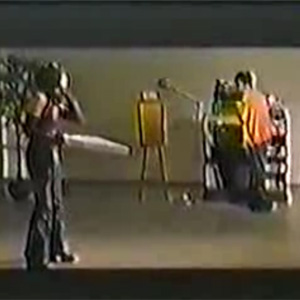Subversive Saturday: Breakfast (Table Top Dolly) (1976)
Director: Michael Snow
Country: Canada
Genre: Short
Watch it: Here
Editor’s note: The following review is a continuation of Matthew Blevins’ Subversive Saturdays series.
Few avant garde filmmakers have deconstructed the possibilities of camera movement as succinctly as Michael Snow. The nearly imperceptible movement across the space of Wavelength (1967) illustrated the filmic compromises that are used to condense time and space to create a more digestible cinematic experience, succinctly capturing the universal truth that action is happening all around us despite our limited powers of perception telling us otherwise. The pendulum movements of Snow’s <---> (Back and Forth, 1969) gave us more easily perceived camera motion, but the paralyzed movements were isolated to a singular horizontal plane as it panned back and forth across a finite space, showing the ever shifting context of spaces through the impositions of the people that occupy them. With Breakfast (Table Top Dolly, 1976) Snow illustrates the way in which the artist’s will is imposed upon the subject of their camera, essentially destroying the spaces it tries to passively capture, a phenomenon that scientists commonly refer to as the “observer effect”. Passive exploration of a space is simply not possible, as the mere act of selecting a subject is already limiting the possibilities of what can be captured. The artist carries a lifetime of experiences and collected prejudices that dictate what can be explored and with what tools of exploration, but their limitations are different from our own and we are able to formulate new ideas that may be in diametric opposition of the artist’s original intent.
With Breakfast (Table Top Dolly, 1976) Snow illustrates the way in which the artist’s will is imposed upon the subject of their camera, essentially destroying the spaces it tries to passively capture, a phenomenon that scientists commonly refer to as the “observer effect”.
 The artist dictates which segments of reality will occupy the restraining confines of the celluloid frame, the camera condenses the boundless information of the space being captured in to a two-dimensional representation that consists only of the light being reflected off of the surfaces, and the observer is left with nothing but a hollow and imperfect representation of spaces that may no longer exist in a time that has already passed. Our tendency to replace our own vision with that of the camera’s while watching film further amplifies the inadequacies of the medium because we are incapable of perceiving the entirety of the spectral perversions of light that we call cinema. Our objective eye can only process a small portion of the frames being blasted at us 24 frames per second, again lying to us through the illusion of movement and visual continuity when what we are actually witnessing is a rapid funeral procession of the echoes of dead light that once illuminated film stock to imperfectly capture its luminescent skeletal remains to be re-broadcast and misinterpreted as visual truth to an audience that tries desperately to claim these images as their own objective reality, if only to escape the limitations of their own perception to attempt to assume that of the artist for a short time.
The artist dictates which segments of reality will occupy the restraining confines of the celluloid frame, the camera condenses the boundless information of the space being captured in to a two-dimensional representation that consists only of the light being reflected off of the surfaces, and the observer is left with nothing but a hollow and imperfect representation of spaces that may no longer exist in a time that has already passed. Our tendency to replace our own vision with that of the camera’s while watching film further amplifies the inadequacies of the medium because we are incapable of perceiving the entirety of the spectral perversions of light that we call cinema. Our objective eye can only process a small portion of the frames being blasted at us 24 frames per second, again lying to us through the illusion of movement and visual continuity when what we are actually witnessing is a rapid funeral procession of the echoes of dead light that once illuminated film stock to imperfectly capture its luminescent skeletal remains to be re-broadcast and misinterpreted as visual truth to an audience that tries desperately to claim these images as their own objective reality, if only to escape the limitations of their own perception to attempt to assume that of the artist for a short time.
Breakfast is a film that is simple in content, but immense in the ideas being conveyed. The camera fixates on a cluttered breakfast table and approaches it slowly with a childlike curiosity of its contents. As it inches ever closer, it begins to move the objects, often pushing them out of our area of visibility. The camera’s curiosity is essentially destroying that which has piqued its curiosity while immortalizing it through the capturing of the light being reflected from the objects. Once it realizes the horrifying implications of its deed, the camera quickly pulls back to survey the results of its destructive curiosity. We are then transported to another space that is occupied by a group of students discussing the elements that constitute film. One of the students makes a sly observation about an object that has been broken, reassuring everyone that it was OK because the object had been captured on film, effectively conveying the duality of the artistic process that both destroys and immortalizes its subject. This destruction is literal in Snow’s Breakfast, but the destruction occurs whenever an object is captured, quantified, and reduced to static representations devoid of form and dimension.
One of the students makes a sly observation about an object that has been broken, reassuring everyone that it was OK because the object had been captured on film, effectively conveying the duality of the artistic process that both destroys and immortalizes its subject.
 Moving the camera can allow an artist to explore the expanses of the spaces being captured to give the audience a more fully developed mental image of their dimension and parameters. The audience tries to co-opt the camera’s vantage and remains blissfully unaware of the meta elements that have already bastardized the false truths of the image, as the camera’s presence has already imposed innumerable changes on the environments being captured. Breakfast brings those bastardizations to the forefront, and the destruction of an environment through its observation is more clearly defined as the camera pushes itself closer and closer to the subjects of its lens, actively destroying the contents of the table while shattering the illusionary role of the passive observer. Despite the collection of lies and illusions that constitute the action of capturing and observing film, it is still able to capture a small portion of an abstract idea. Film flattens and perverts the spaces that it captures (literally in the case of Breakfast), creating impositions on the environment, and ultimately leaving us with nothing more than the skeletal fragments of obfuscated light that our minds naively misinterpret as a part of our own temporal reality. The waters become further muddied with the passage of time and the deterioration of the medium, and with Breafast we are left with nothing more than an imperfect copy of an imperfect copy of light that once travelled through temporal spaces that we can claim as our own distorted vantage for its 17 minute runtime.
Moving the camera can allow an artist to explore the expanses of the spaces being captured to give the audience a more fully developed mental image of their dimension and parameters. The audience tries to co-opt the camera’s vantage and remains blissfully unaware of the meta elements that have already bastardized the false truths of the image, as the camera’s presence has already imposed innumerable changes on the environments being captured. Breakfast brings those bastardizations to the forefront, and the destruction of an environment through its observation is more clearly defined as the camera pushes itself closer and closer to the subjects of its lens, actively destroying the contents of the table while shattering the illusionary role of the passive observer. Despite the collection of lies and illusions that constitute the action of capturing and observing film, it is still able to capture a small portion of an abstract idea. Film flattens and perverts the spaces that it captures (literally in the case of Breakfast), creating impositions on the environment, and ultimately leaving us with nothing more than the skeletal fragments of obfuscated light that our minds naively misinterpret as a part of our own temporal reality. The waters become further muddied with the passage of time and the deterioration of the medium, and with Breafast we are left with nothing more than an imperfect copy of an imperfect copy of light that once travelled through temporal spaces that we can claim as our own distorted vantage for its 17 minute runtime.
Just as critical as film’s imperfect ability to capture spaces is its incomplete ability to capture ideas. This is why we subject ourselves to its strategic transmutations of light, not necessarily in the hopes of co-opting the camera’s perception as our own, but in the hopes of interpreting the infinitely diverse results of those obfuscations as thoughts and ideas. The transition of an idea from humanity’s collective unconscious to the artist to the observer and back to the public consciousness is a process rife with imperfections, but it is what is lost in the translation and filled back in by the mind of the observer that gives film its immutable power. The content contained within the frame remains relatively constant as it begins its immediate and slow deterioration into non-existence, but the ideas that we can take from its limited content and form are boundless.











 Review: The Pact (2012)
Review: The Pact (2012) Subversive Saturday: Breakfast (Table Top Dolly) (1976)
Subversive Saturday: Breakfast (Table Top Dolly) (1976) Review: A Cat in Paris (2011)
Review: A Cat in Paris (2011) Review: Babycall (2011)
Review: Babycall (2011) Review: Madagascar 3: Europe’s Most Wanted
Review: Madagascar 3: Europe’s Most Wanted



